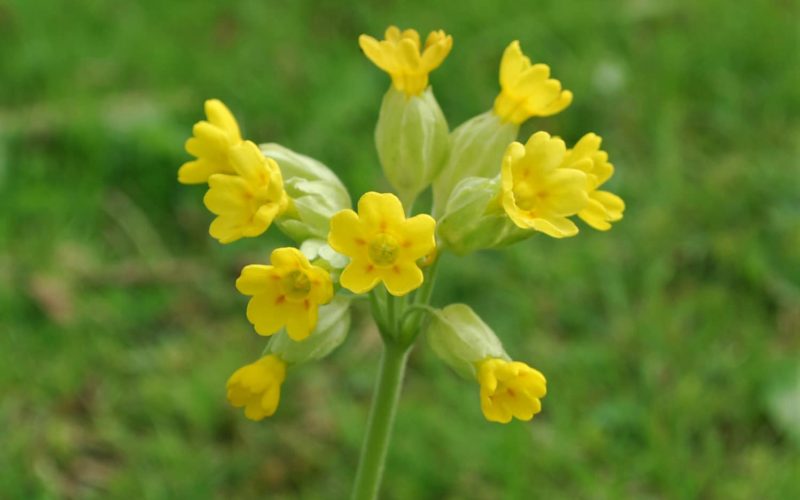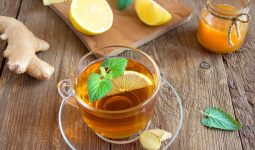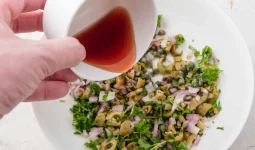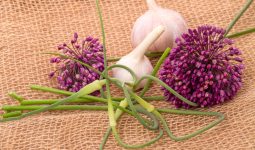Cowslip or herb Peter is a common herb that grows in temperate regions of Europe and Asia. It has amazing medicinal properties and both the fresh and dried forms are used.
This herb is a small plant that has sweet smelling flowers. The flowers have orange dots on them. This herb also has small rhizome which enables the thick short roots to rise and form a bud.
Cowslip or herb peter is harvested in the spring season. The primary use of cowslip in natural medicine is to treat bronchitis, insomnia, swollen nose, and a sore nose.
Other names for this herb are:
- Arthritica
- Buckles
- Butter rose
- Crewel
- Cuy lippe
- Drelip
- Fairy cups
- Herb peter
- Key of heaven
- Key flower
- Mayflower
- Our Lady’s keys
- Paigle
- Pasywort
- Password
- Peagle
- Peggle
- Pretty mulleins
- Plumrocks
- Printemps
- Promrose
- Primula
- Primular officinalis
- Tittypines
The common name of this plant was derived from the old English for cow dung because it was commonly found growing amongst cow dung in pastures where they grazed.
Also, it loves growing on slippery and boggy ground. Aside its medicinal purpose, it can also be used as an ornament because it beautifies gardens with its beautiful yellow flowers.
You can plant it alongside other ornamental plants like iris, white and red carnation, amaranth, cornflower, poppy, roses, periwinkles, and daffodils.
Health Benefits of Cowslip or Herb Peter
1. A powerful expectorant
The flowers and roots of cowslip are used as expectorant to treat cough, cold, and flu. It is a powerful home remedy for whooping cough in ancient home remedies.
People suffering from chronic coughs will benefit from it, especially those with catarrhal congestion and chronic bronchitis, and other febrile conditions like flu.
When taken, the flowers induce sweating. This, in turn, relieves flu, nasal congestions, and feverish colds.
The flowers and leaves of this plant are powerful expectorant, diuretic, diaphoretic, and anodyne.
2. Relieves arthritic symptoms
Arthritis is a painful condition caused by the inflammation of your joints. You can relieve painful joints by soaking Cowslip roots in a decoction and drinking it.
3. Skin ointments
Herb Peter has skin-repairing properties. Ointments made from cowslip flowers are used to treat skin blemishes and sunburns.
4. Relieves insomnia
Cowslip tinctures treats insomnia, over excitement, anxiety, and other nervous disorders. The yellow flowers are used by herbalists to treat sleeplessness and over-activity in children.
5. A powerful pain relief
If you are looking for effective natural painkillers, think of cowslip. Combine cowslip essential oil with neutral oil like coconut or olive oil and give yourself a good massage on the painful area.
This is highly effective in treating migraine headaches and nerve pain.
6. Rich in salicylates
The rich content of salicylates in this herb makes its action similar to that of aspirin.
Other traditional uses of cowslip or herb Peter are:
- Used to relieve spasms, rheumatic pains, paralysis, and cramps.
- It is used to treat asthma and other allergic conditions
- The roots can be dried and grinded into powder to serve as a sternutatory (a substance that causes or induces sneezing).
- The root is a mild diuretic, it also has anti-rheumatic properties and it also slows down blood clotting.
- Homeopathic compounds are made from this plant
- It relieves kidney symptoms and catarrh
- It treats kidney complaints and infections of the urinary tract
- Cowslip syrup is made by mixing crushed flowers with honey and water. This treats cough and relieves asthma symptoms.
- The flowers are mild sedatives and they help calm children and make them sleep.
- It is widely used to treat whooping cough in Europe
- It treats Parkinson’s disease, tremors, and epilepsy.
- The petals of the flowers are used to relieve or prevent convulsions, spasms, and also a sedative to help sleepless and hyperactive kids.
- Oil made from chopped flowers is used to treat bruised skin and other conditions of the skin.
Ayurvedic Formulas Of Cowslip
Allergies
To treat allergies, prepare a concoction using Elder flower, cowslip, Gentian root, and sheep sorrel. Take this concoction two times daily.
Cervicitis
This condition of the vagina can be healed with cowslip. Boil 10 to 12 flowers of cowslip in 1 litre of water for 15 minutes using a low flame. Leave it to get cool and then wash your vagina with this solution.
Wash both inside and outside. If possible, you can sit in this water for 15 minutes. Do this daily until the symptoms vanish.
Can Cowslip Be Used to Cook?
Cowslip also has culinary uses. The leaves are used in making traditional Spanish salad. In Europe, the flowers are used to flavor wine and vinegars.
The flowers are used as coloring agents in deserts. The young leaves are eaten raw or used to cook soups. The dried or fresh leaves are healthy tea substitutes.
The flowers are used as garnish and ornamental addition to salad bowl. Cowslip flowers are also used to make tasty wine and they give it a nervine and sedative property.
How To Use Cowslip or Herb Peter
There are many ways to use herbs as medicine. For a herb like this, you can prepare tea using the leaves. This helps in cases of insomnia and hyperactivity.
You can make lotions with this herb to treat acne, sun burns, and other skin problems.
The flowers of herb Peter are boiled and taken to treat colds. You can also soak the flower in white wine and drink. This is a good tonic for the heart.
Some of the available forms of cowslip as medicine are:
Infusion
The infusion of cowslip flowers (dried flowers) is available and you can get them from a reputable online store. You can then make your own infusion at home from a tablespoonful of dried cowslip flowers.
Pour this in a cup of boiling water and leave it to infuse for 15 minutes before consuming it. This is very effective for colds.
Decoction
Use the root of cowslip to make a decoction. Pour a teaspoon full of the root powder in a cup of water. Pour in a pot and boil the mixture then you set it aside.
After it gets cool, drink it to strengthen your heart and circulatory system.
Cowslip syrup
Mix crushed cowslip flowers with honey and water and drink. This helps in relieving breathing disorders.
Cowslip tea
This is a powerful home remedy against insomnia. Get 50 grams of cowslip herb, 25 grams of lavender flowers, 10 grams of St. John’s wort, and 15 grams of hop plant.
Take a spoonful from the above mentioned herbs and mix well in 0.25 liters of water. Leave it to sit for 3 minutes. Consume this tea when warm before going to bed.
Boiled mixture of cowslip roots
This particular form of cowslip is effective for kidney problems. Get 50 grams of cowslip, 50 grams of elder, 15 grams of nettle leaves, and 15 grams of dandelion roots.
Take a spoonful of these herbs and mix in 0.25 liters of water. Bring this mixture to a boil and let it sit for 3 minutes. Take 2 cups daily until you see an improvement in your condition.
Cowslip wine
Put 2 liters of fresh flowers in a bottle of water and top it with white wine. Make sure the flowers are completely covered. Cover the bottle and leave it to sit in sunlight for 14 days.
For treating heart and cardiovascular conditions, you take 3 to 4 spoonful daily.
Cowslip herbal tea
Boil a cup of water in a pot and add 1 teaspoon of loose cowslip flower and stem mixture. Boil this for 3 more minutes and leave it to get cool.
Strain this mixture and drink when it gets cool. Take 2 to 3 cups daily.
Cowslip compress
You can make medicinal herb packs for use on the outer part of your body to relieve pain, inflammation, and other physical discomfort.
Prepare a decoction by boiling 200 grams of roots and rhizomes of cowslip per liter of water.
Boil this until the quantity reduces by more than half of its original volume. Use this as a compress and apply it to the affected area.
It can relieve back pains, inflammation, swellings, wounds, etc.
Risks and Precautions for Cowslip
People who are allergic to aspirins should not take cowslip because they contain salicylates. Pregnant women should avoid this herb. Breastfeeding women can take this in little quantity as it stimulates the production of breast milk.
People taking anticoagulants should not take cowslip. Also take in low doses because an excessive amount can cause queasiness, nausea, diarrhea, vomiting, and gastrointestinal irritation.
Apart from the above conditions, cowslip is safe especially when taken under the direction and supervision of a professional.
Sources;







